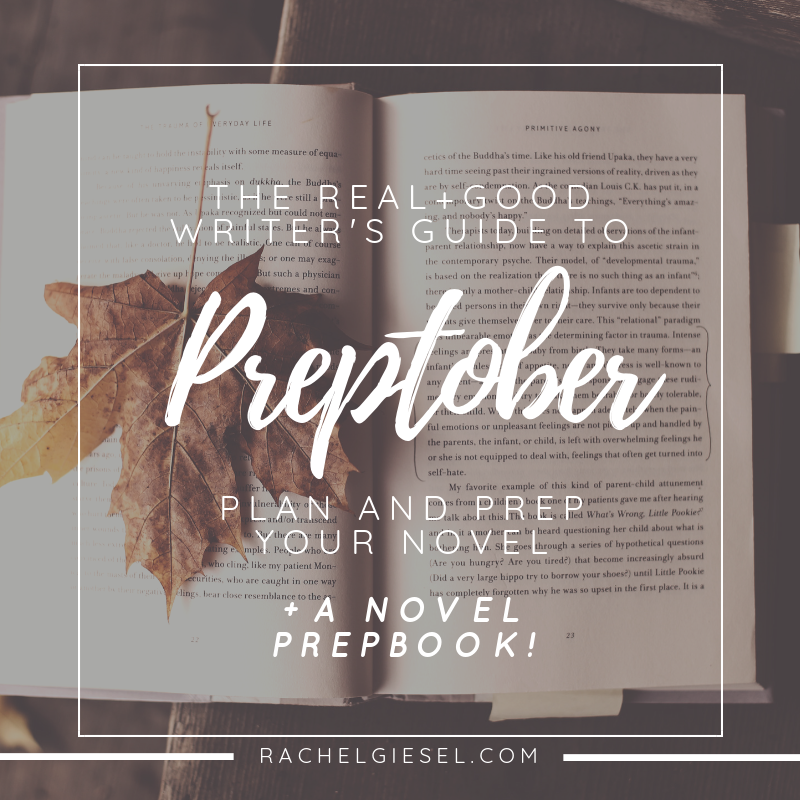If you want to grow as a writer, you have to put in some work. You have to learn about craft, you have to lay the proper mental foundation, you have to get the writing done consistently, again and again. There are TONS of avenues to help you grow as a writer, and many of them are free.
But when you're ready to take your writing to the next level, you're going to have to invest. And this is where a LOT of writers get unnecessarily held back.
One of the biggest myths I see from writers all the time goes something like this: "I need to make money from writing before I invest money into writing," or "The writing has to prove its worth before I spend any money on it."
And this is SUCH a big myth.
Many writers attempt to correlate writing and finances, requiring that the two work together and grow together. The idea is: if the writing makes me money, I'll put money into it. But this isn't how writing works.
First of all, we're not writing for the money (or at least, you shouldn't be). If you haven't noticed yet, let me reveal a super hard truth to you real quick: Writing doesn't make a ton of money. If you want to be a writer because you think you're going to earn millions of dollars, you're writing for the wrong reasons.
Only a very, very small percentage of writers make a full-time income from their writing alone. As of 2014, most authors earned less than $1,000/year. Most of them have day-jobs in addition to their writing careers to supplement this, because I don't know about you, but I can't live on $1,000 a year.
And that $1,000 is usually after the advance, which (if you're in that small percentage that gets accepted for publication) is going to be around $5,000-$10,000 for a first book.
“The huge advances that you hear of are very rare. Most fiction writers can’t live by their writing alone. I spent nearly ten years sending out stories before I got one published. Being a writer almost always means having some kind of paying job too... and hanging in there!”
Read Ursula's truths on the writer's "salary" here.
But we're still writing anyway. We're not going to quit writing because the financial numbers aren't what we'd hoped. We're still creating worlds and characters and stories because they deserve to be told.
If you're itching for that book deal that gets your story told, you're going to have to work really really hard. You're going to have to be patient. You're going to have to learn to be a Real+Good Writer. And you're going to have to quit waiting around for this writing to make you a ton of money.
Because, how do you become one of the few writers who actually earns income from your writing? You increase your odds at getting accepted by a publisher and getting a solid book deal. You increase your odds at writing a book that readers will buy.
And how do you increase your odds? By writing a really good book.
And how do you write a really good book? You learn.
And how do you learn? You invest in your writing and yourself to be the best writer you can be, and to write the best book you can write.
Why invest in writing?
When you invest into your writing life, you're going to dig into your wallet. To learn and grow, you're going to have to spend some money.
But you're not throwing money away. You're investing in yourself and your writing career. You may invest in books, courses, workshops, conferences, an editor, a coach. It might cost you a bit up front, but when it helps you accomplish your writing goals and transform you into the writer you want to be, it's worth it.
If writing were anything else, it'd be easy to justify the investment. Let's say, for example, you were starting a workout routine to get into shape.
- You'd invest in good gym shoes, because you couldn't go to the gym in your flip-flops.
- You'd invest in workout clothes.
- You might purchase some weights at home, or a yoga mat, or a video course for how to workout.
- You might purchase a gym membership to get access to equipment you need.
- You might join a yoga class, or Pilates class, or spinning class, to meet fellow workout buddies and hold yourself accountable.
- If you knew you really wanted to lose weight, but weren't very good at keeping yourself accountable, or you didn't even know where to start with working-out, you'd invest in a personal trainer. You'd pay for someone to coach you, teach you, and help you get to your fitness goals.
And you wouldn't question this. You wouldn't demand that you must be in shape before you invested in a personal trainer. That just doesn't make any sense. You invest in these things up-front to help you reach your overall goals.
Writing is the same way.
To write the book you want to write, and to be the writer you want to be, you've got to invest in yourself. Depending on where you are in your writer's journey and what your current needs are, those investments are going to look very different. But you've got to invest in your writing in some capacity if you want to succeed.
If you look at it another way: You can't afford to delay your writing growth and dreams any longer. Choose to consciously invest in yourself and your writing in ways that will push you towards your achieving your goals.
I've invested in my writing throughout my whole writing life. My college degree (a very large investment) is in English and Creative Writing. I've taken online writing courses, like Holly Lisle's How to Think Sideways writing class and The University of Iowa's International Writing Program's classes. I've attended writing programs, conferences, and retreats, like Writing Workshops in Greece. I buy Moleskine notebooks, writing software like Scrivener, craft books that teach and mentor writers. Heck, even fiction books are an investment in my writing, because I learn from every story I read! I've paid to self-publish a physical book before. I pay for marketing myself (through this very website—the hosting, the domain name, the email list). I pay for printing and printer paper and printer ink.
Come to think of it, I actually spend a lot of money on writing. And I don't get a lot of money coming back in, at this point in time.
And I want to invest SO MUCH MORE. There is so much to learn with writing, and I want to get my hands on all of it. There are writing conferences I want to attend, writing retreats I want to take. There are books I want to read and classes I want to enroll in. I want to hire a writing coach, and an editor, and marketing and publicity strategist.
And I plan to do it. I will invest in all of these things. Because I can't afford not to be the best writer I can be. My stories depend on me. And I won't let them down.
“Investing in yourself is a way for you to hold yourself accountable. When’s the last time you accomplished something that didn’t require a sacrifice?”
I love how Maya Elious explains investing: "Investing in yourself is the difference between a poverty mindset and a wealthy mindset. A poverty mindset is believing that you do not deserve things of value so you consistently settle for less. A wealthy mindset is believing that you deserve the absolute best and you’re willing to work hard to attain it."
Investing into your writing life helps you be a better version of yourself, so you can take your writing to the next level. You build a wealthy mindset by valuing your writing, valuing yourself as a writer, and taking the steps you need to take to get where you want to go.
Now, am I saying you need to go spend a bajillion dollars on your writing life right now? Absolutely not!
How you need to invest will change depending on what you need from your writing and your writing life at any given point in time.
How to figure out what you need to get started
If you're trying to LEARN MORE ABOUT writing CRAFT:
- Try a craft book. Janet Burroway's "Writing Fiction"(*affiliate link!) was my Bible when I started taking fiction seriously.
- Take a class either online or in person.
- Join a workshop.
- Find a teacher to guide you.
If you need time and space to get to the writing done:
- Consider a writing retreat. You could DIY your own writing retreat, or attend one of the many offered around the world.
- Also, definitely consider a writing residency. Writers colonies and residencies are competitive and difficult to get into (isn't everything difficult with this writer's life?) but you get exactly the time and space to truly zone into your manuscript.
If you need help actually getting the writing done:
- Find an accountability partner.
- Join a writing community.
- Take a class that teaches you how to finish your stories.
- Hire a writing coach to work with you individually.
If you need help with your particular work-in-progress:
- Hire an editor to critique your words.
- Hire a writing coach to help you get the words down.
- Find a writing community for workshops.
- Learn the technique that's holding you back (either through a craft book or an online class).
Now, where do you even find these things?
I've got a few good places to start. This list is NOT exhaustive—there are SO many classes, coaches, editors, teachers, residencies, and workshops to choose from. These are just the few that made the tippy-top of my list.
Writing Classes:
- The Real+Good Writer's school (this is me!)
- E.M. Welsh
- Holly Lisle
- University of Iowa's International Writing Program
- Catapult
- Gotham Writers
- Writerology
- Tomi Adeyemi
- Story is a State of Mind
Editors + Manuscript Review:
Coaching:
Conferences / Retreats / Workshops:
- Writing Workshops in Greece
- Breadloaf Writers Conference
- Tin House Writer's Workshop
- Iowa Summer Writing Festival
- Stonybrook Southampton Writers Conference
- Sewanee Writers' Conference
- AWP Conference
- Iceland Writing Retreat
- And if you want the master list: PW's got you covered.
Residencies:
I haven't taken all of these classes, or worked with all of these people, or attended all of these programs. These are just snippets from my lists of what makes sense for me and my writing life, and where I plan to pursue my investments.
When evaluating where to invest in your writing life, make sure you evaluate what and who makes the most sense for you. As you can see, there are TONS of different programs and editors and coaches and classes (and this list is NOT exhaustive). You could spend the rest of your life going through them all.
But don't do that.
How to choose where to invest
Invest in people and things that speak your language, that resonate with you, that seem to get who you are and what you need. You should always (always always always!) go into your investment from a place of "yes," ready to commit, ready to learn, ready to trust what you're getting whole-heartedly.
If you want to take your writing seriously and you don't want this writing thing to be just a pastime anymore, you NEED to invest in your writing life. How you do it is up to you, and specific to the needs of your writing life right now, but you've got to invest somewhere.
So make a plan and invest in your writing. Evaluate where you are and what you need. Evaluate the methods you could take to meet that need. Evaluate the specific programs/people/things to find someone you trust, and who works for you individually. Then make a decision to commit to investing in your writing life and becoming the writer you hope to be.
Happy Writing!
♥
How have you invested in your writing life before? What books, classes, coaches, residencies, retreats, or conferences have been the most helpful for you?















